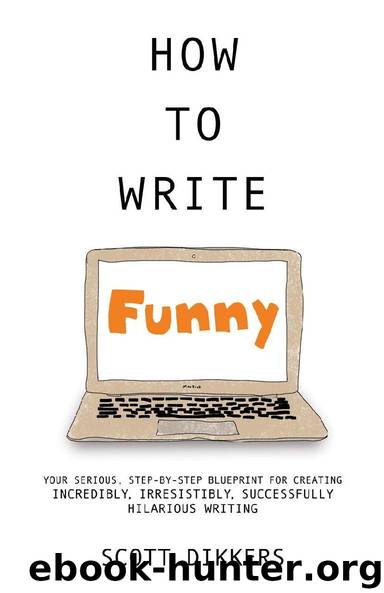How to Write Funny: Your Serious, Step-By-Step Blueprint For Creating Incredibly, Irresistibly, Successfully Hilarious Writing by Scott Dikkers

Author:Scott Dikkers [Dikkers, Scott]
Language: eng
Format: epub, azw3, mobi
Published: 2014-05-09T22:00:00+00:00
POOPING AND FARTING
Amateur humor writers often turn to pooping and farting with the expectation that instant and hardy laughs will result. These and other bodily functions count as gross-outs and therefore Shock. That means they technically qualify as legitimate humor when used properly (that is, in moderation and/or in service of good Subtext). The problem with most amateur pooping and farting humor is that it’s not used in moderation, and it rarely has any Subtext.
The human butt is the single funniest thing in the known universe. This is undisputed. Any time a human butt is referenced, seen, or used in a joke, the effect is immediate: Everybody laughs. But people also recognize that the butt is a one-trick pony. They know it can serve as a great addition to an already clever joke or humor sequence (i.e., one that uses multiple Funny Filters and good Subtext), but by itself, they will get tired of it quickly.
Amateur humor writers don’t realize this fact, so they often milk the butt for as many poop and fart jokes as they can. They don’t realize the returns diminish very quickly. They also don’t realize that it’s the butt that’s the funniest thing in the universe, not pooping and farting.
Pooping is a serious gross-out reference. Those 14-year-old boys will laugh at your poop jokes, but you’ll lose everyone else almost immediately.
Fart jokes are of a slightly different order. They are, in fact, the H-bomb of comedy. We all recognize the power of farts to generate laughs, and it’s easy to imagine winning the war of comedy instantly and decisively by just “dropping the fart bomb on ’em,” but it’s worth considering what happens after an H-bomb is detonated: everything is destroyed. You can use fart jokes to get your big laughs, but once you’ve used the most powerful weapon in the humor arsenal, how are you going to follow it up?
Because they’re so easy and so lowbrow, a lot of humor writers avoid fart jokes altogether. They consider them “too easy,” the domain of amateurs.
But when comedy writers do brave the subject of the fart, they traditionally try to make the funniest possible fart joke they can. Their reason being, if they’re just making fart noises to get a laugh, that’s crass, but if they’re harnessing the immense power of the fart, they insist on doing it masterfully, so as not to come off as taking advantage of the “easy out.”
Some of the best examples of great fart jokes are Steve Martin’s “farting section on airplanes” bit, Blazing Saddles’ campfire scene, and Mr. Show’s “dueling fartists.”
Download
How to Write Funny: Your Serious, Step-By-Step Blueprint For Creating Incredibly, Irresistibly, Successfully Hilarious Writing by Scott Dikkers.azw3
How to Write Funny: Your Serious, Step-By-Step Blueprint For Creating Incredibly, Irresistibly, Successfully Hilarious Writing by Scott Dikkers.mobi
This site does not store any files on its server. We only index and link to content provided by other sites. Please contact the content providers to delete copyright contents if any and email us, we'll remove relevant links or contents immediately.
Asking the Right Questions: A Guide to Critical Thinking by M. Neil Browne & Stuart M. Keeley(5775)
Autoboyography by Christina Lauren(5235)
Eat That Frog! by Brian Tracy(4540)
Dialogue by Robert McKee(4404)
Sticky Fingers by Joe Hagan(4199)
Journeys Out of the Body by Robert Monroe(3624)
Annapurna by Maurice Herzog(3468)
Full Circle by Michael Palin(3450)
Schaum's Quick Guide to Writing Great Short Stories by Margaret Lucke(3381)
Elements of Style 2017 by Richard De A'Morelli(3350)
The Art of Dramatic Writing: Its Basis in the Creative Interpretation of Human Motives by Egri Lajos(3067)
Atlas Obscura by Joshua Foer(2962)
Why I Write by George Orwell(2954)
The Fight by Norman Mailer(2941)
The Diviners by Libba Bray(2938)
In Patagonia by Bruce Chatwin(2930)
The Mental Game of Writing: How to Overcome Obstacles, Stay Creative and Productive, and Free Your Mind for Success by James Scott Bell(2909)
Venice by Jan Morris(2574)
The Elements of Style by William Strunk and E. B. White(2473)
